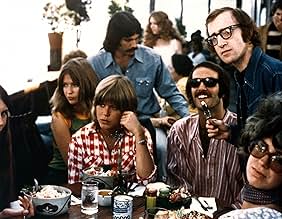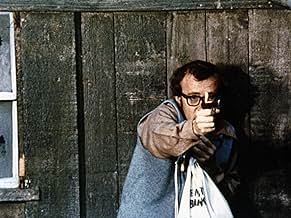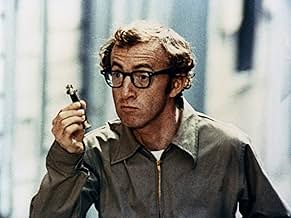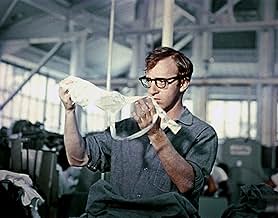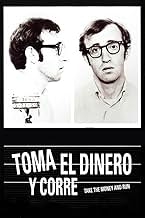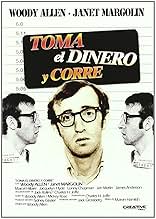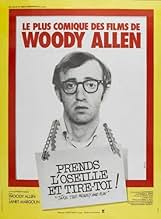The life and times of inept bank robber Virgil Starkwell.The life and times of inept bank robber Virgil Starkwell.The life and times of inept bank robber Virgil Starkwell.
- Awards
- 3 nominations total
Dan Frazer
- Julius Epstein - The Psychiatrist
- (as Don Frazier)
Jackson Beck
- The Narrator
- (voice)
- Director
- Writers
- All cast & crew
- Production, box office & more at IMDbPro
7.232.6K
1
2
3
4
5
6
7
8
9
10
Featured reviews
Taking Ideas and Using Them.
Very early Woody Allen winner has the all-time lovable loser trying to make ends meet with girlfriend and future wife Janet Margolin. Allen, obviously pretty unskilled in most everything, decides that he can do just what the title of the film says and achieve true happiness with his one true love. Documentary-styled footage makes the picture unfold in a quietly uproarious way as Allen uses corny techniques used by most news organizations to tell a story that would have looked very odd without his insight being involved. Allen's films only work because he makes them work usually and that is definitely the case with "Take the Money and Run". Once again he shows unlimited potential and would use this movie, more than any other, as a spring-board for much future success in the 1970s, 1980s and beyond. 4 stars out of 5.
Remember: You can't wear a beige shirt to rob a bank!
"Take the Money and Run" is an absolutely hilarious Woody Allen film, done in a quasi-documentary style, about a career criminal, Virgil Starkwell, who has a very unsuccessful career. His prison breaks don't go as planned, his robberies are a disaster and usually coincide with someone else's robbery of the same place, and his planning of a job would be fine if only he weren't talking to an associate in a restaurant while the police are in the booth behind him. One nice perk of failure: while attempting to rob a young woman's purse, he falls in love with her (Janet Margolin). Virgil does admit at one point thinking of foregoing robbery and taking up a career in singing. He doesn't mention the cello, which gave him his start in music - and crime.
This is one of those laugh out loud even when you're alone movies of which there are all too few. But this is one. Over a tough, FBI-type narration, we watch Virgil's futile attempts at making money through crime, see his parents (disguised) interviewed, as well as his wife and the various police and investigators he meets along the way.
It's amazing to look at this film and then look at "Match Point" done 35 years later and see the evolution of this brilliant man. Woody Allen is capable of rock-solid comedy as well as provocative movie-making. Although he's had a few blips along the way, one wonders what he'll think of next.
This is one of those laugh out loud even when you're alone movies of which there are all too few. But this is one. Over a tough, FBI-type narration, we watch Virgil's futile attempts at making money through crime, see his parents (disguised) interviewed, as well as his wife and the various police and investigators he meets along the way.
It's amazing to look at this film and then look at "Match Point" done 35 years later and see the evolution of this brilliant man. Woody Allen is capable of rock-solid comedy as well as provocative movie-making. Although he's had a few blips along the way, one wonders what he'll think of next.
The Saga of a Clumsy Smalltime Thief
The clumsy Virgil Starkwell (Woody Allen) is bullied when he is a child. Then he decides to play cello, but without musical talent, the loser joins a street gang and ends in prison. When he escapes, he meets the laundry worker Louise (Janet Margolin) and lies to her, telling that he plays cello in the symphonic orchestra.
He is arrested in a hold up and Louise finds him in prison. He breaks out and flees with Louise to another state. He tries to be honest but he is incapable to fit in any job. When he finally finds a job position suitable for his intellect, he is blackmailed by a colleague and returns to his criminal life. But his heists are disastrous and he always ends in prison.
"Take the Money and Run" is the second film by Woody Allen in a documentary style the same way he does with "Zelig" in 1983, and tells the saga of a clumsy smalltime thief. The last time I had seen this film was on 22 August 1999 and this time I found it still enjoyable, but less than the last time.
Virgil Starkwell is an incompetent loser obsessed with bank heists. The narrative and interviews in the documentary style of the 60's and 70's have hilarious moments and is closed by the funny interview of his neighbor that asks to the interviewer how an imbecile like Virgil could plan the heist of banks. My vote is seven.
Title (Brazil): "Um Assaltante Bem Trapalhão" ("A Very Clumsy Thief")
He is arrested in a hold up and Louise finds him in prison. He breaks out and flees with Louise to another state. He tries to be honest but he is incapable to fit in any job. When he finally finds a job position suitable for his intellect, he is blackmailed by a colleague and returns to his criminal life. But his heists are disastrous and he always ends in prison.
"Take the Money and Run" is the second film by Woody Allen in a documentary style the same way he does with "Zelig" in 1983, and tells the saga of a clumsy smalltime thief. The last time I had seen this film was on 22 August 1999 and this time I found it still enjoyable, but less than the last time.
Virgil Starkwell is an incompetent loser obsessed with bank heists. The narrative and interviews in the documentary style of the 60's and 70's have hilarious moments and is closed by the funny interview of his neighbor that asks to the interviewer how an imbecile like Virgil could plan the heist of banks. My vote is seven.
Title (Brazil): "Um Assaltante Bem Trapalhão" ("A Very Clumsy Thief")
Highly entertaining feature-length film debut from Woody Allen.
Take the Money and Run (1969) was Woody Allen's motion picture debut (sans 'Tiger Lily). The film follows the life of a criminal loser, shot in a faux documentary style. Allen used the most out of his small budget and made an amusing film. This was the beginning of his slapstick/farce phase that would last until the early 70's. An interesting start for one of America's most unique film-makers of that era. The script by Mickey Rose and Woody Allen is deeply engraved with screwball humor from their childhood icons such as the Marx Brothers and Charles Chaplin. This film showed the promise of a brilliant director who would become a major player in Hollywood in the years to come. Highly recommended.
A.
A.
Laugh-a-Minute spoof of Crime Documentaries a Must For Woody-ites...
TAKE THE MONEY AND RUN is Mel Brooks-like in structure and gags, but definitely Woody Allen at his comical best. Its not his greatest picture by any means, but perhaps the best of his early slapstick flicks (SLEEPER, BANANAS). "Virgil Starkwell" has a hard time stealing right from the start. When a criminal gets a gumball machine "stuck to his hand", you know he's in the wrong gig. Woody Allen is right at home with this innocent, documentary-style drip on the unintentional hilarity of 60's crime documentaries. Woody, or "Virgil", seems to be playing Woody as usual, something we all know runs through his entire body of work. This movie is very much like his innovative ZELIG of 1983, a black and white docu-spoof about a fictional chameleon.
Jackson Beck's narration is PERFECT in making the outrageous material seem "serious". It no doubt inspired the short spoofs "Saturday Night Live" would go on to produce for years, investigative reporting seemingly important, yet ridiculous in content. "Virgil's" parents are in disguise (Groucho Marx nose and glasses) whenever they are "interviewed". The chain gang escape is one of the funniest sequences I have ever seen. Woody also moves into romantic territory with the beautiful Janet Margolin, who had a nice, fat purse for "Virgil" to steal, but also has a quick reaction to his inept robbery attempt and, of course, they fall in love. She is there for "Virgil" to live for during his always brief prison stays and to pick out his clothes for a robbery. There are some familiar elements here, most obviously the beautiful young girl falling for a middle-aged homely Woody.
TAKE THE MONEY AND RUN is all about raw comedic filmmaking and mockery. It is not a situational film at all, just a bunch of perfectly cohesive episodes of this perfectly moronic bank robber, who spells gun G-U-B. Wouldn't that throw us all off if we were the bank tellers taking a note during a stick up ?
Jackson Beck's narration is PERFECT in making the outrageous material seem "serious". It no doubt inspired the short spoofs "Saturday Night Live" would go on to produce for years, investigative reporting seemingly important, yet ridiculous in content. "Virgil's" parents are in disguise (Groucho Marx nose and glasses) whenever they are "interviewed". The chain gang escape is one of the funniest sequences I have ever seen. Woody also moves into romantic territory with the beautiful Janet Margolin, who had a nice, fat purse for "Virgil" to steal, but also has a quick reaction to his inept robbery attempt and, of course, they fall in love. She is there for "Virgil" to live for during his always brief prison stays and to pick out his clothes for a robbery. There are some familiar elements here, most obviously the beautiful young girl falling for a middle-aged homely Woody.
TAKE THE MONEY AND RUN is all about raw comedic filmmaking and mockery. It is not a situational film at all, just a bunch of perfectly cohesive episodes of this perfectly moronic bank robber, who spells gun G-U-B. Wouldn't that throw us all off if we were the bank tellers taking a note during a stick up ?
Did you know
- TriviaThe first widely-released "mockumentary".
- GoofsAs the chain gang escapes, they climb the same embankment twice.
- ConnectionsFeatured in The Dick Cavett Show: Woody Allen (1971)
- How long is Take the Money and Run?Powered by Alexa
Details
Box office
- Budget
- $1,500,000 (estimated)
- Runtime
- 1h 25m(85 min)
- Sound mix
- Aspect ratio
- 1.85 : 1
Contribute to this page
Suggest an edit or add missing content



